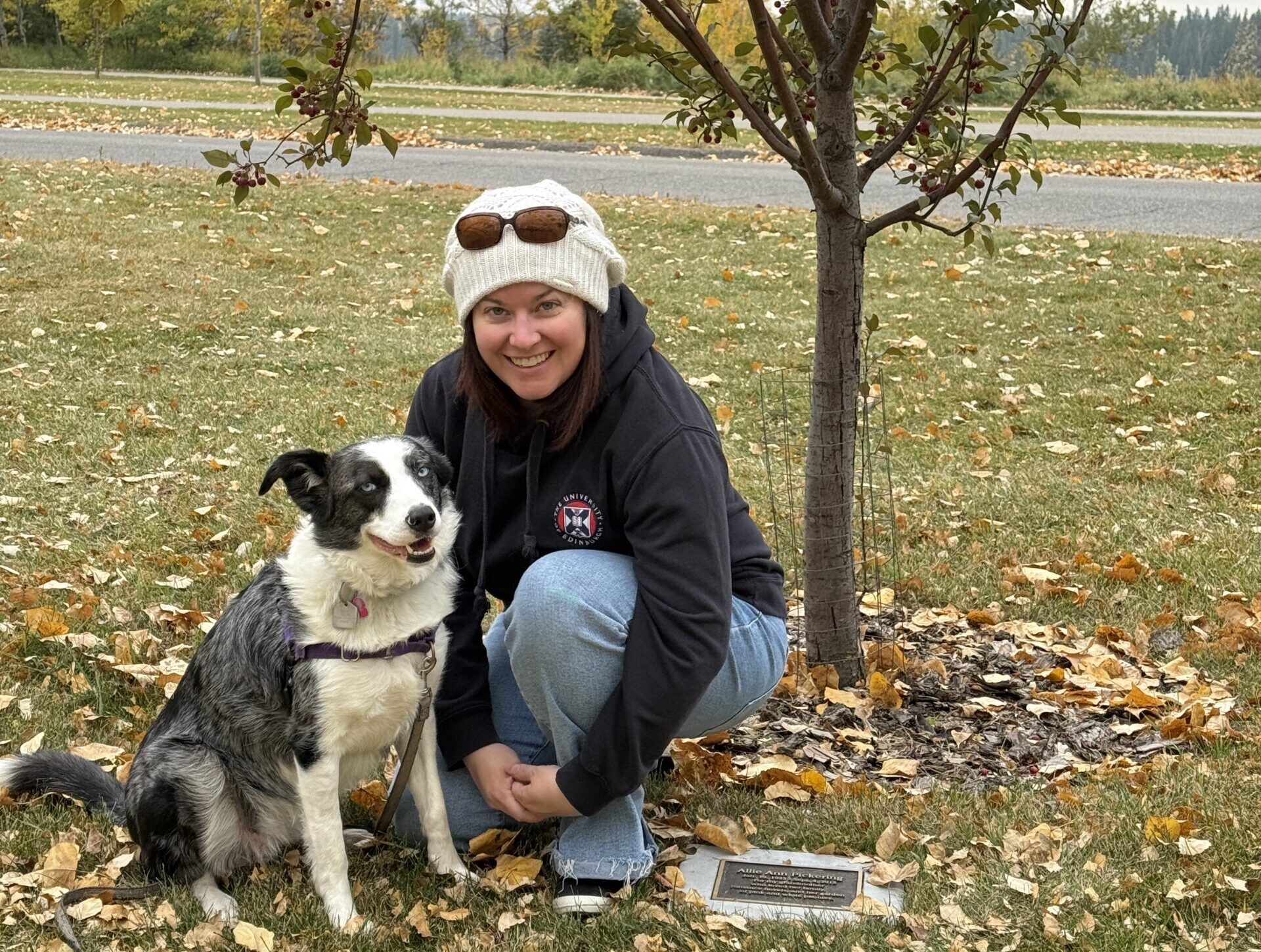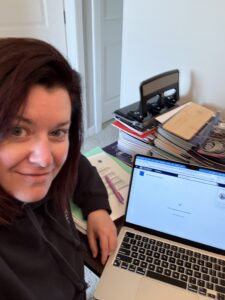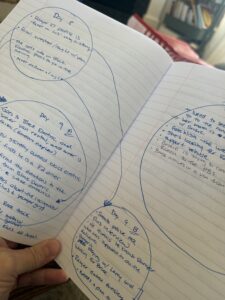I’m panicking. I’m fine. The emotional rollercoaster of submitting a PhD

In one single day, my brain would tell me that a) I couldn’t spare fifteen minutes to shower and b) I was further ahead than I thought. Then, hours later, my brain would convince me that they only way I could edit my novel was using a series of binders, and in fact I needed to purchase multiple binders and sticky notes immediately. Then, I would later find a section in the novel that was missing important information, sending me into a panicked spiral, where I would skip dinner and hover over my laptop while eating a bowl of cereal.
Nothing made sense in those final eight weeks.
How I wanted to feel when I submitted
My state of mind was incredibly important to me on my submission date. I knew from the very beginning that I needed a calm and relaxed submission. I didn’t want to feel panicked, stressed, or under-slept…and in fact, feeling any sense of panic was the equivalent of experiencing a personal failure. I wanted to feel confident and ready.
But in the weeks leading up to my original deadline of August 30, 2025 (moved to September, more on that later), I was not feeling confident, calm or relaxed. I was an oscillating fan of emotions: stress, confusion, frustration, resignation, exhaustion, irritated, relieved, and drained.

The reason for the turmoil came down to my novel, rather than my critical thesis (which didn’t change much).
I had convinced myself (many times, in fact) that my novel was done. In an earlier blog post, I had described my process of writing the conclusion and I felt quite confident in it. But in the months leading up to my original submission date, something happened, and the novel changed (for the better).
I didn’t know what a finished novel looked like
Earlier in year, sometime around May, I had submitted my novel to a publisher in Edinburgh through an open submissions portal. I don’t know why they had an open submission window, if it was advertised, or even how I knew it was there — but for some reason, I sent in the first three chapters of my novel and kind of forgot I had done that. About a month or so later, I got an email from their fiction editor, asking to see the whole manuscript so, thinking my novel was done (it wasn’t), I sent off the full-length novel. And waited. Then, maybe weeks later, I got a rejection that came with some personal advice about the book. There were things the editor loved, but also, there was too much going on (feedback I had received from an agent previously, and believe it or not, I HAD trimmed things down).
Hearing this news wasn’t great, but I knew I was cramming this novel full of layers of political tension, themes of national identity, race and gender critiques, criticisms of the justice system, policing, as well as commentary on the crime genre, the police procedural as a form, and the notion of the hero. Arguably, the novel is…alot. And for this editor, it was too much. Her suggestions were clear: less cops, less office politics, include more on the mother character, more of the hot Scottish detective Chris McEwan, heightened motives for the bad guys, and a more solid ending.
I wasn’t angry about the suggestions at all. I was curious. Was she right?
A new creative process to fix the novel
I have a couple of methods to edit my writing. Method one is the delete button. If something isn’t working, I delete it. Some writers think I am nuts, and this is lunatic behaviour, but I hate nit-picking things. I am a fast first-drafter so it is genuinely easier for me to start from a blank page.
My second process is the highlight and layer method. I go into Word, change the page colour, and highlight different layers of the novel. For example, I highlighted every single cop and colour-coded them according to their precinct or group. The Calgary cops were pink, the Ontario ones were blue, the Scottish cops were green, etc. Then I zoomed out so I could see the every page of the novel on my screen.
Shit. There were too many cops.
The editor was right.
I didn’t have a process for what came next, and so I developed the circle method. I got out my notebook, drew multiple large circles, and put every character into their respective grouping. Then I had to ask myself, what would happen if I deleted them? Who linked to who? Which cops were essential, whereas which ones could be reduced to the background?
And just like my delete button, I started crossing their names off one-by-one.
The thematic premise was revealed
I methodically repeated this process (delete, highlight, circle) until I made it through all of the editors suggested changes. And it was annoying me because she was right on all accounts. The novel was getting better and better. Argh! I had to keep going, and going, and going.

The circle method
Then a cool thing happened. The thematic premise of the novel became clearer and clearer. When I hit a point of confusion, or a moment where I was questioning what to do, I went back to my critical reflexive which is grounded in setting.
One detail that had started to bother me was the night raid. My earlier draft featured an airport setting, and although this setting technically worked, it also didn’t really fit the theme. Was the answer to this problem somehow in the setting? It took me awhile to make the decision, but ultimately I swapped the location from an airport to a race track, and suddenly, more elements of the story ending fell into place.
The ending I wanted
In addition to my novel ending, I also had my own story – the story of me writing my PhD, and the ending I wanted. Even though the novel was becoming more and more thematically relevant, it still took time to revise and edit. But the problem was, I was losing time. Life gets busy, and it felt like even the smallest requests on my time were eating into me successfully finishing the PhD on my own terms.
So, I started brainstorming ways to gain more time, but somehow – with every minute I gained, something would happen that would also cost me time.
- I quit my corporate job to gain time, but I also got offered three teaching positions which cost me time (planning lectures).
- I went to a conference in London to find an external examiner, which cost me time, but resulted in a confirmed examiner which meant saving time.
- In August (my original deadline), I got in a minor car accident, and the CRA notified me that they wanted to audit my taxes, which cost me time (filling out paperwork).
- As a result, I had to apply for an extension, to gain that time back.
Minor life events literally felt like time being sucked from my body. I needed every single minute, and small things like completing forms for taxes, rescheduling medical appointments, and even selling my Oasis tickets, were all vacuums on my personal time. I began hoarding time.
- Thesis and Critical Reflexive
The extension was a life-saver in giving me time back. It meant that even though I was pushing hard to the finish line, on the day before submission, I had ticked all the boxes, prepared my files, and went to bed feeling confident and relaxed. Any changes from this point forward, I would have to catch in minor revisions.
I wasn’t alone
But the saving grace for me, throughout my entire PhD is that – I wasn’t alone. I had Sam, my research collaborator, on my same timeline. We were submitting together. We were both surfing through the waves of exhaustion, and emotional highs and lows, as we lurched to the finish line. Our daily voice notes were part self-motivating messages, sounding boards, and to-do lists. They were mental health check-ins and reminders of administrative bits and pieces (did I need a signed declaration or not?).
Sam kept me sane and above water. I wasn’t over-thinking in isolation, and I wasn’t questioning my delusions or hallucinations (we were both having them!). Arguably, Sam had a less relaxed push to the finish line, but was similarly juggling her own time constraints with contract jobs, financial challenges, and far more footnotes and page number issues than I was dealing with. I proofread one of her chapters whilst in a hospital cafe, waiting for my annual neurology check-up, and spent my health review discussing the liminality of consciousness with my neurologist.
Submitting a PhD is weird
These are the strange experiences with submitting a PhD thesis that I could not have predicted. But the common theme wasn’t simply having time, but having less constraints on my personal time. And arguably, it is very difficult to shore up against unexpected time demands four years in advance.
Are there things I would have done differently? Yes, I would have probably left my corporate job a few months sooner, but the window of opportunity only opened for me in July. I would have also had six weeks of meals prepared. And would have had access to generational wealth, or atleast funding from SSHRC (rather than being queued on the waitlist). Time was gold, but I was also indebted to that editor who gave me feedback that changed my novel for the better.
I feel more confident in defending my thesis now, and even though I could not have planned everything that happened – on Tuesday, September 30, 2025 I hit submit on my doctoral thesis. Then, I went for a walk with my partner and my dog, and visited my grandmother’s tree.
I was calm and relaxed, exactly how I wanted to be.






